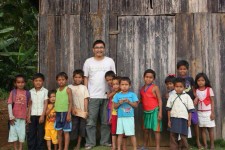There are 5 chapels under the Our Lady of Mediatrix of All Grace Parish , Bukidnon, which need help in repair and improvement:
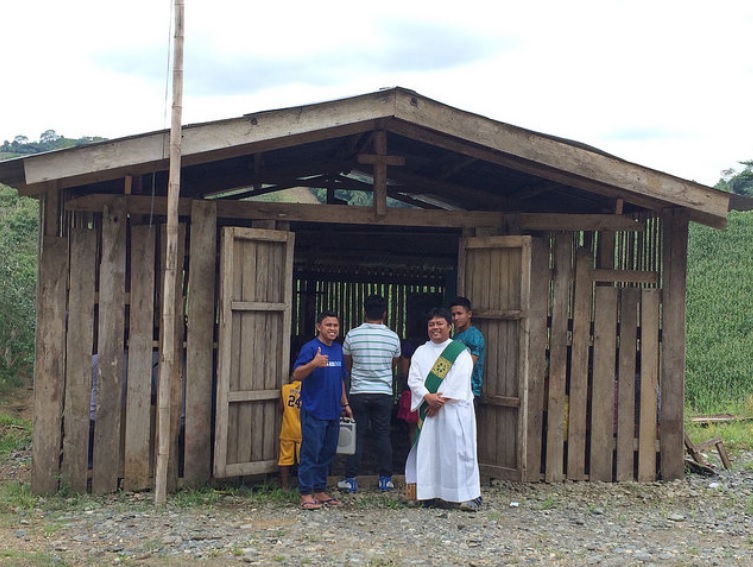

There are 5 chapels under the Our Lady of Mediatrix of All Grace Parish , Bukidnon, which need help in repair and improvement:
UPDATE: The chapel has been constructed. Thank you to all benefactors!
On March 16, 1906, Fr. Manuel Valles, S.J. arrived as the first chaplain assigned to Culion. He immediately gave workmen instructions to help with the daunting tasks of the leper colony. In the next years, the Jesuit Mission extended to the islets around the mainland, to lepers and non-lepers alike. With assistance from generous benefactors and friends, the Jesuits were responsible for building some hospitals, dormitories, schools, the church and chapels, roads and the airstrip, while taking care of the spiritual needs of the people. Presently, the work of the Jesuits is undertaken with the La Inmaculada Concepcion Parish and Loyola College of Culion with special ministry for the Indigenous People of Palawan.
Serving the Tagbanuas. In the 1990s, when the number of lepers drastically declined due to the implementation of the Multi-Drug Therapy (MDT), the chaplaincy’s mission for lepers became a point for reflection. After discernment, a new call to serve emerged in Culion, this time for our Tagbanua brethren.
The Literacy Program. In the early years of the literacy program, the parish spearheaded in establishing ties with nearby communities. In 2009, the first teachers who were parish catechists, were sent to teach our brethren basic reading and writing. During that year, the partnership with Cartwheel Foundation, Inc. was initiated in order to assist in the training of teachers which included the provision of learning aids designed specifically for the Tagbanuas. The year 2010 marked the first graduates of the adult literacy program and in the last five years , the program, now recognized by the Department of Education, has expanded to include grade school children.
After 110 years of love and service, on July 21, 2016, the Jesuits of the Philippine Province will formally turn-over La Inmaculada Concepcion Parish to the care of the Apostolic Vicariate of Taytay.
Turnover of the La Inmaculada Concepcion Parish.The Philippine Jesuits have been declining in numbers over recent years. Because of this, the Philippine province, cannot sustain all of its ministries. In this regard, some of the Jesuit parishes had to be turned over to the local clergy including the La Inmaculada Concepcion Parish. However, the Jesuit’s work in Culion will still continue thru the Loyola College of Culion, where the IP Literacy Program will fall under.
As part of the turnover agreement with Bishop Edgardo S. Juanich of the Apostolic Vicariate of Taytay (AVT), a new rectory with some facilities had to be built since the Jesuits will still reside at the present one. Thus, the “Fr. Manuel Valles, S.J. Parish Center and Rectory” currently in construction will serve as the residence of the incoming parish priest from AVT. It will house the parish office as well.

The Literacy Program in Culion, Palawan aims to develop the reading and writing skills of both the adults and children in selected Tagbanua communities. The program also aims to preserve the Tagbanua’s local culture and develop stronger and more confident communities.

In 1904, Gov. Wright of the American Commonwealth, established Culion as a leper colony paving the way for the first batch of 370 lepers from all over the archipelago to settle in 1906. In the same year, American Jesuits were sent to Culion to start chaplaincy work for the lepers and employees of the Philippine Health Service. Over the years, the Loyola College of Culion was established and has seen the chaplaincy to La Inmaculada Concepcion Parish grow and flourish.
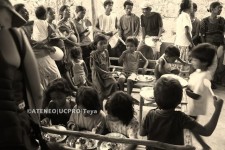 Fr. Bok Arandia SJ, during his stay in Culion wrote, “after the establishment of the leper colony, the indigenous Tagbanua communities who were the original inhabitants of the Culion peninsula were forced to settle in remote islands, with limited access to basic social services and education. They manage to survive through fishing, food gathering, and primitive agriculture. However, because of their inability to read, write and count, certain devious individuals have taken advantage of their ignorance, cheating them to sell their produce and catch at scandalously low prices. Politicians have likewise used them to secure victory during elections, gathering and containing them in undisclosed holding areas distant from the influence and access of their political rivals.”
Fr. Bok Arandia SJ, during his stay in Culion wrote, “after the establishment of the leper colony, the indigenous Tagbanua communities who were the original inhabitants of the Culion peninsula were forced to settle in remote islands, with limited access to basic social services and education. They manage to survive through fishing, food gathering, and primitive agriculture. However, because of their inability to read, write and count, certain devious individuals have taken advantage of their ignorance, cheating them to sell their produce and catch at scandalously low prices. Politicians have likewise used them to secure victory during elections, gathering and containing them in undisclosed holding areas distant from the influence and access of their political rivals.”
In 2006, the Philippine province re-examined its mission in Culion. Since there was no need for chaplaincy work due to the fewer number of lepers in the island, the Province decided to help the Tagbanuas, an Indigenous People community, through a literacy program.
In 2008, through the help of the Sisters of St. Paul of Chartres, a literacy program was began with some teachers from the parish. In 2011, Cartwheel Foundation brought their expertise and modules to help aid and systematize the program. Since then, the parish, SPC and Cartwheel have been partners in this endeavor.
The program
Before 2011, literacy programs that were introduced had no sustainability mechanisms in place. Hence, there was a crucial and urgent need to establish one that will remain a fixture in order to equip members of the communities with essential literacy and life skills.
The first six-month cycle of the new program began at the end of August, 2011 with forty (40) adult learners from two (2)Tagbanua communities – Alulad and Marabal.
In June 2013, the adult capability-building program ran its third cycle, further expanding operations to four (4) indigenous communities from the original two (2) pilot areas. They have also instituted an early childhood education program for the Tagbanua communities in Culion.
Currently, the Adult Literacy Program is run by the Cartwheel Foundation, Our Lady of the Immaculate Concepcion Parish and the St. Paul of Chartres Sisters. Fr. Arthur Nebrao, SJ is currently Parish priest of La Inmaculada Concepcion.
Typhoon Yolanda hit Culion with devastating effects. These photos were taken during the visit of the Ateneo Disaster Response and Management (DReaM) Team and the Simbahang Lingkod ng Bayan in Culion, Palawan last December 5 to 9. The team visited the different areas and islands devastated by Typhoon Yolanda.
Indigenous Peoples, like the Tagbanuas are generally discriminated not only because of their physical appearance but because many of them have low self esteem due to the lack of reading and writing skills.
Please donate to support the Literacy program and help build their lives in the aftermath of typhoon Yolanda! The Literacy program’s next steps are:
Click the Blue box above to make an on-line donation. Or else, click here.
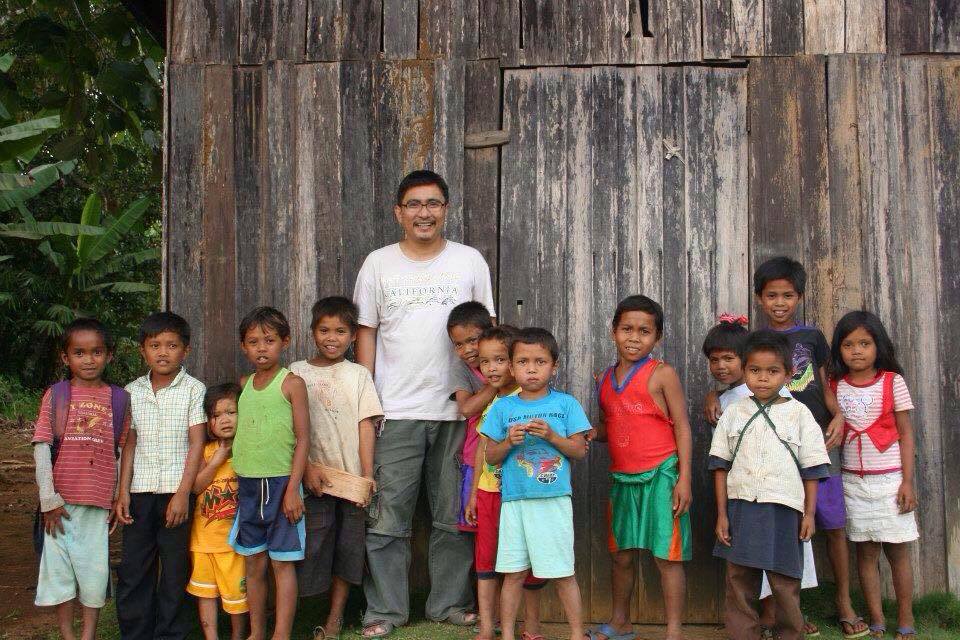
St. Therese of the Child Jesus was established by Jesuit missionaries thirty (30) years ago. It subsists largely due to the generosity of the foreign and local benefactors, mostly friends and relatives of missionaries assigned in Miarayon, who see the wisdom in educating the youth of the mission area alongside delivering spiritual nourishment of the people.
When the pioneer missionaries get transferred to other assignments, benefactors and donors of the school stop supporting the school or transfer their support to other projects of the previous missionaries. Often, the school is left operating on a shoe-string budget and on many occasions, borrows funds from the Philippine Province of the Society of Jesus for the needed upgrade and upkeep of its facilities.
The passage of The Enhanced Basic Education Act (R.A. 10533) in 2013, which seeks to increase and improve compulsory education from 11 to 12 years, adds to the burden because of the need to accommodate a greater number of students.
Miarayon is a barangay of the fourth class municipality of Talakag, Bukidnon. It is a community of tribal minorities: Talaandigs (80%), Dumagats (15%), Maranaw Moslems (4%) and Igorots (1%) comprising about 5,000 families. The local dialect is Binukid but most could speak the Visayan language. The area has limited access to water and electricity and the roads may be accessed mainly by motorcycle (habal-habal), horse-riding or walking. There is no reliable signal for telecommunication yet.
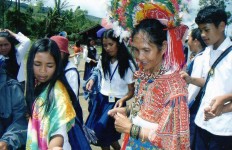
The Talaandigs are friendly people. They are deeply religious and value family and social kinship. They are reliable and industrious. Despite these traits, many remain poor because of the lack of opportunity to get proper education. To know more about the Talaandigs, view the full video made by Symantec Tooth and Gum Care here.
St. Therese School of Miarayon is the only High School operating in the area covering about five (5) barangays or villages with about seven (7) or so public elementary schools. The next available High Schools are some sixty (60) or so kilometers away from the centro. In 2015, there are approximately 320 students. However, this figure dips radically due to students who drop out within the first quarter of the school year. Of the students who continued, approximately 500 students have graduated and a good number have gone on to college and earned their degrees.
